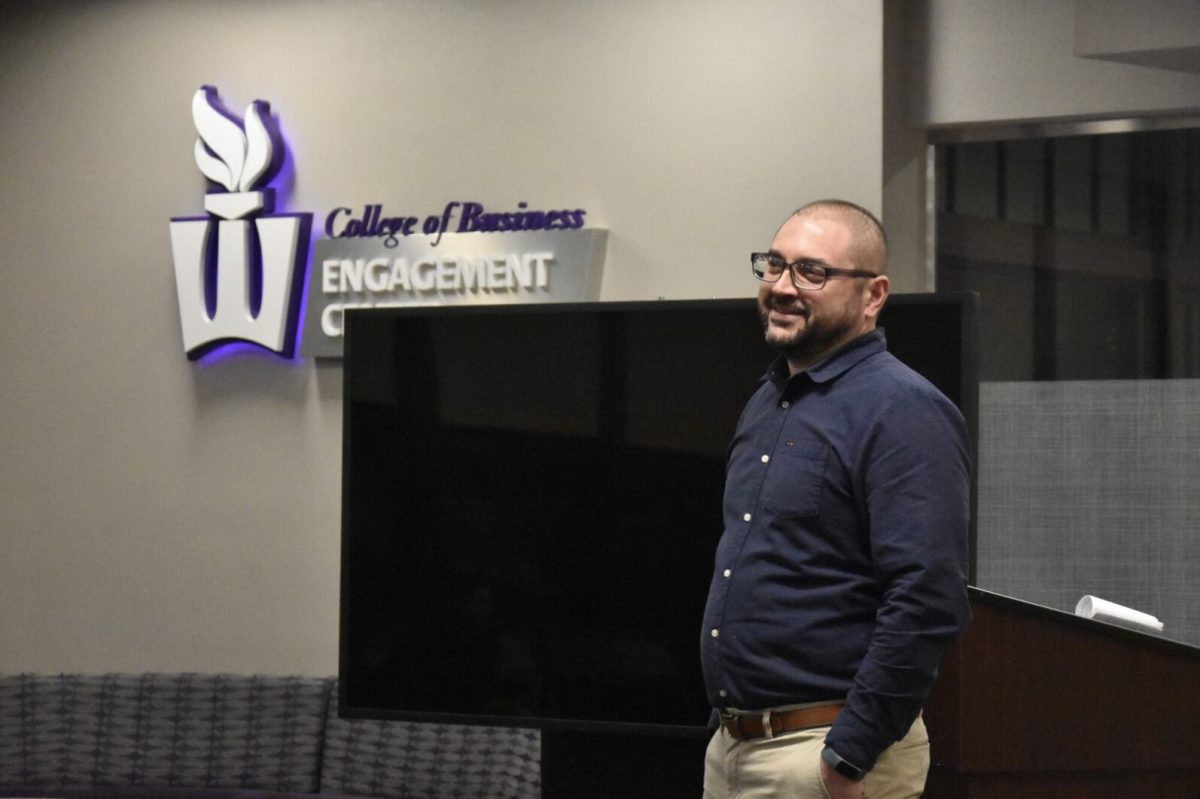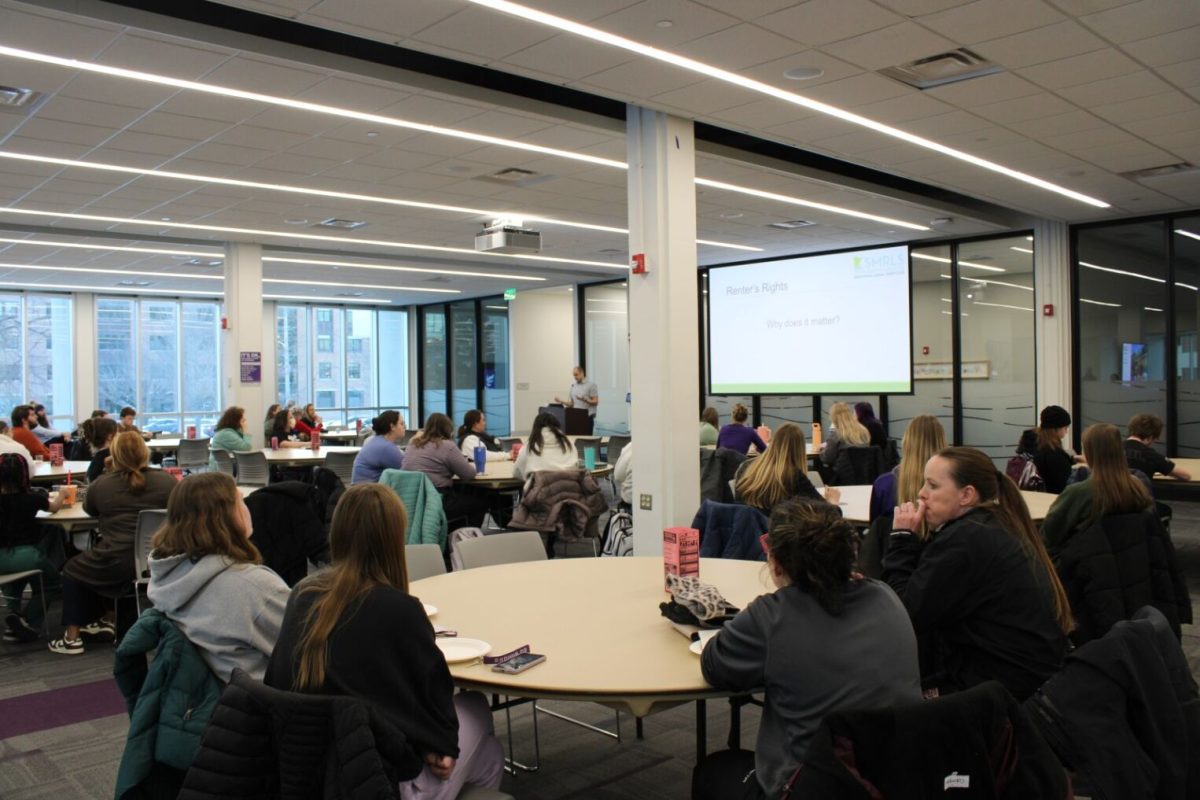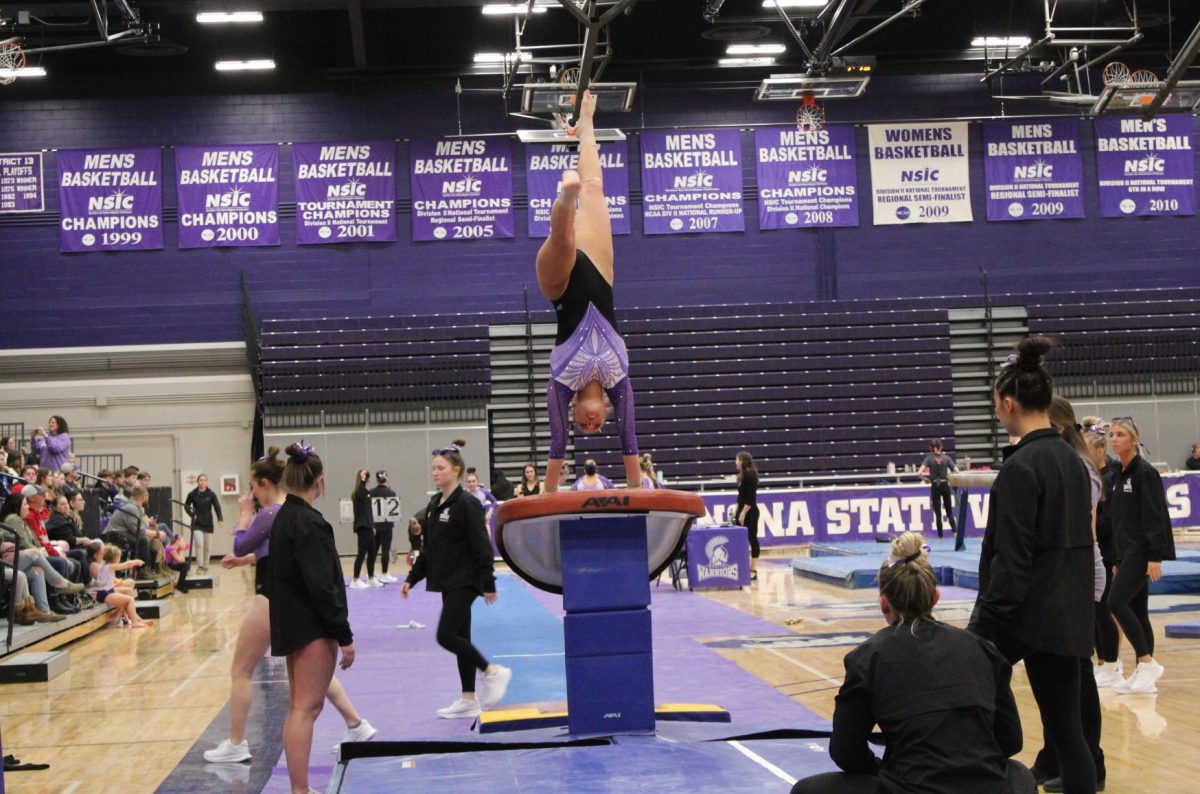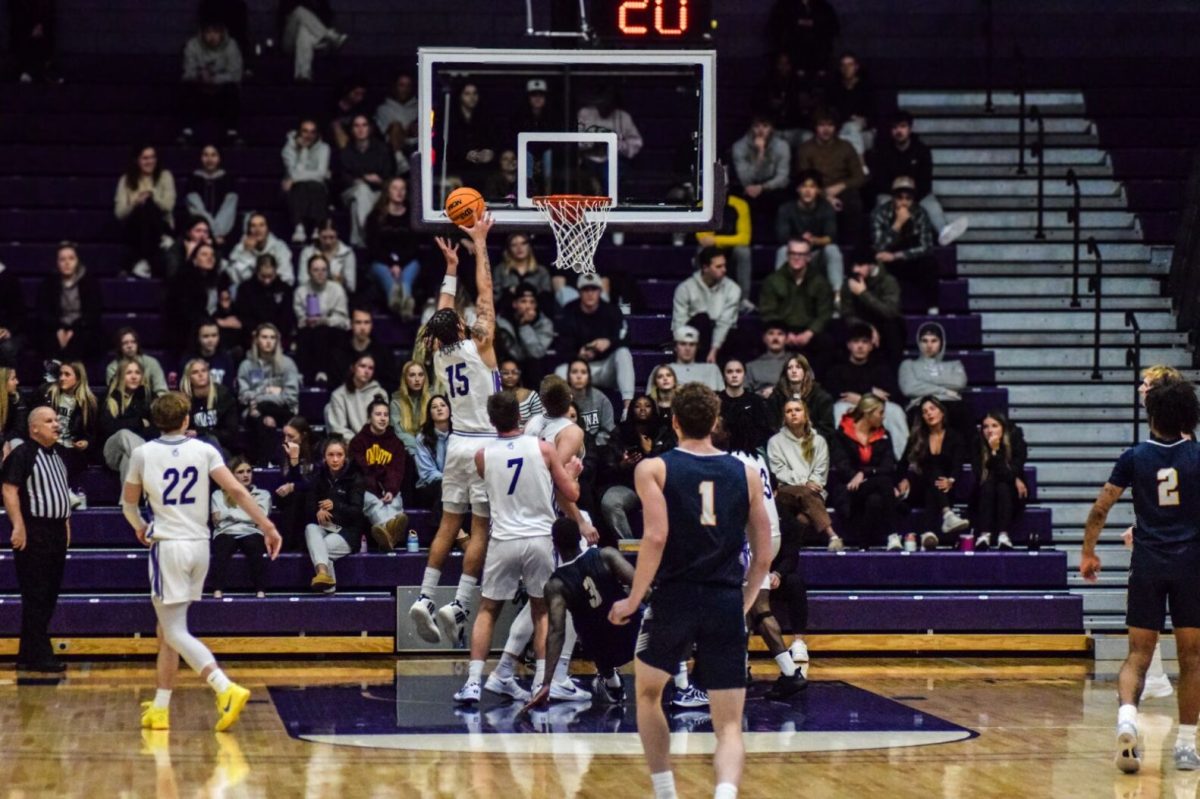“From the age of eight, I was dreaming of this moment and I couldn’t believe I was finally here.”
With the name ‘Alexandra Raisman’ shining brightly on TV screens across the world at the 2012 London Olympics before her floor routine with gold medals on the line, she recalls the dream she had at eight years old.
Aly Raisman started gymnastics at two years old with her mother, a former high school gymnast, in a local Mommy & Me class. Now she is a two-time national champion on floor exercise, the 2012 national champion on balance beam, and a five-time medalist in the all-around at the national championships. She also is notable as a silver medalist in her floor exercise and beam in 2016 at the Rio de Janeiro Olympics. On Thursday, March 14, Winona State University athletes, students and community members packed into Harriet Johnson Auditorium in Somsen Hall to see Raisman share her experience as a decorated Olympic athlete and why she is so much more than her sport.
“I used to do gymnastics and [Raisman] was one of my role models, so I figured it’d be a super cool opportunity to see her,” second-year student Mari Mohling, who has done gymnastics since she was little, said. “It was a big part of my life; I almost came to college and did it, so it was my whole life… [I’m excited] to hear her talk about her experiences with gymnastics.”
Being the oldest of four kids, Raisman has always loved the role of big sister and was always grateful for her parent’s involvement and support in her life and her career. As a child, being involved in multiple sports, she always knew she loved gymnastics the most.
“When I was eight one of my [gymnastics] coaches said ‘If you want to do the next level, you have to choose between soccer and gymnastics.’ I chose gymnastics, obviously, but when I look back now I feel like that’s sort of silly at such a young age to make such a big decision,” Raisman said. “I didn’t know it was such a big decision at the time, but it was kind of a no-brainer for me. My parents just let me make that decision for myself so I’m very grateful for that.”
At age ten, Raisman took ‘the next step’ and moved gyms to be with the coaches she would eventually bring to compete at the Olympics. At this gym, Raisman noted that she was never shy about her dreams to her coach Sylvia Brestyan. Additionally, she remembers begging her coaches to let her stay later and she was thankful that they did because then her love only continued to grow and she didn’t feel burnt out.
“My coach would say let’s start to work on this skill on floor or do this because one day when you get to see the Olympics, this is what we want your floor team to look like…It’s a progression of a very long time of a lot of hard work,” Raisman said. “Competing at the elite level is a lot more intense than people realize. I knew I wanted to be there and wanted to do whatever it took to get there, but it was definitely hard. I’m glad I’m done and I’m not in a gym anymore.”
Qualifying for the Olympics is a feat not all gymnasts can do. With the years of training and discipline needed, Raisman noted that it’s more intense than people realize. First-year student on the gymnastic team, Reagan Kelley, has been doing gymnastics for 16 years and doesn’t seem to be stopping anytime soon as she starts her college career at WSU.
“I have always just been in love with this sport, and it’s pretty easy to stay committed to it because it’s kind of like the only sport that I’ve known,” Kelley said. “It’s really awesome [being on a college team]. The team atmosphere is amazing, we’re all so close and I can’t wait to keep doing it.”
Raisman navigated finishing high school by taking online classes and managing her day so she would be able to train. She highlights that her training was as important as her recovery and thanks the audience for not laughing when she mentioned she would nap in the middle of the day.
“[Training] was intense and it was hard. I look back and I don’t know how I worked that hard but I just wanted to look back with no regrets and to know that I did everything that I could,” Raisman said. “It became more intense because as you get older, there’s more pressure on us and I felt so much pressure for us to win.”
Fourth-year student and WSU gymnastics athlete Ashley Roth can also relate to the need for mental toughness to continue to love your sport, but Roth also reminds athletes of why this hard work is all worth it.
“I have been doing gymnastics since I was seven years old and I actually just finished out my career last weekend. I was just excited to get out there and do my [floor] routine one last time,” Roth said. “ It’s been a long journey and it shaped me into who I am and I’m grateful for the opportunity to have been able to do this work for so long. Ali Raisman [has] been a huge inspiration for me inside and outside of the gym.”
At age eight, Raisman’s life would change forever when her mother showed her a VHS tape that her grandfather had recorded of the 1986 Olympic gymnastics team. After a short pause, laughs escaped from the audience as Raisman explained what a VHS tape was and how it inspired her to continue doing gymnastics.
“I discovered what the Olympics was, and I watched it over and over…I just fell in love with it. I knew I wanted to be there,” Raisman said. “I had all the scores memorized, I knew all of the gymnasts, I knew all their routines and knew from then on I wanted to do the Olympics, but I was eight so I didn’t know how hard it would be to get there; but that was really the moment where I thought ‘I wanna be there someday too.’”
During the 2012 London USA Olympic team, Raisman knew she had won gold before her floor performance was even finished. Shedding tears, she ended this historic run and excitedly hugged her coaches and teammates. Holding hands with the rest of the USA Olympic team called the Fierce Five, it was announced that they had won gold medals in the team and floor competitions. Raisman then became the most decorated American gymnast at the 2012 Games, winning three medals.
“I was so nervous and right before I went to compete, I actually thought about this full circle moment of years ago when I was eight, I was watching the Olympics and I was obsessed,” Raisman said. “Just thinking, there’s some eight-year-old kid out there that’s watching us compete, and one day maybe they’ll come to the Olympics or maybe they won’t, but there’s someone out there who’s watching it. And it helped calm me down a lot.”
Despite pressure to work harder from fans and even from herself, she took a break after her first successful go at the Olympics. After taking a break to attend college in 2013, she returned to her gym. While her coaches thought it wasn’t serious, it only pushed her harder. While she struggled to deal with the pressure of how many people were watching, it never stopped her from doing what she thought was best for her.
“In a good way, I don’t have this [priority as a gymnast anymore]. I used to have that, and I think it drove me to be successful at gymnastics, but finally, I’m really happy and content with my career. I don’t want to wake up every day and feel like I’m not doing enough,” Raisman said. “It kind of felt like I had to act like everything was fine because there’s only five gymnasts on the [Olympic Floor] team. So, I was afraid if they knew that I was anxious or struggling, that they wouldn’t pick me.”
Waiting excitingly for the event to start, third-year student Hanna Reichenberger recalls that she did gymnastics from age 3 to 15. She had loved the sport but after an injury, she chose to be a coach for the next three years.
“I definitely feel like the gymnastics popularity is growing,” Reichenberger said. “It’s cool especially for women’s sports in general because we are overshadowed a little bit. So, it’s cool to come hear a woman speak especially with her experience that we’ve seen in the media.”
As a perfectionist and an athlete, Raisman noticed as she progressed in her career, she found that the media and people around her began to scrutinize her weight and pushing her to feel the need to be thinner.
“A lot of people can relate to defining themselves by their sport or their result and I think that’s very normal, but I wish there was more conversation in sports to prevent that because you’re so much more than an athlete or whatever you do. You’re so much more than your work,” Raisman said. “It’s really important to figure out other things outside of what makes you successful, and figure out things that make you happy because that’s what ultimately has helped me in my post-gymnastics career.”
Gymnastics has allowed Raisman to meet so many new people and experience so many things that she can only be grateful for because it has helped her learn so much more about herself as a person and as an athlete. She laughed to herself and noted that sometimes she feels a little like Hannah Montana. Where there has to be a version of Aly where she is on all the time and one where she is just Aly in sweatpants hanging out with her dog.
During her post-gymnastics career, Raisman is finalizing a children’s book called From My Head to My Toes. Her goal with the book is to teach body autonomy to help normalize conversations about body image and being able to feel empowered and safe to speak up. It’s special to her to see and hear about the books that are being read to children and that soon her book will be one of them. In addition to her post-gymnastics career, she noted that her work with ESPN this January as a gymnastics analyst has reminded her of the best parts of gymnastics.
“It’s great to see how much the sport is growing…Every week there are multiple gymnastics meets so every week you can highlight different gymnasts and different things that they’re doing. And I like how it’s not just about the number one gymnast,” Raisman said. “One of the girls was going on bars and she has to have pancakes before every meet…so I mentioned it during her bar routine because sometimes gymnastics can be so serious and intense.”
Grit and talent alone will never get a person to the Olympics. Support, discipline and determination are what push an athlete to take that next step to pursue a sport professionally. Through the good and bad, Raisman is very content with her career.
“I survived in my gymnastics career because my parents weren’t pressuring me. There’s already enough pressure from my coaches and other people,” Raisman said. “I saw a lot of my teammates when I was younger who were better than me, but they ended up stopping gymnastics because their mom put so much pressure on them. I’m very grateful that if I didn’t do well, I genuinely knew that I would just hug my parents and cry and they would support me.”
Pressure and mental stress can easily suck all the love out of doing a sport. Support is very important to athletes, especially at a young age where they are just figuring out who they are as a person. During times when they go through a struggle with themselves and their performance, Raisman noted that support is something that sticks with them the most.
“When I watched the Olympics [when I was younger], I thought that everything was just perfect all the time and they just never had anything wrong…No matter who you’re watching, who you look up to, or who you follow on Instagram or how many followers someone has– We’re all human,” Raisman said. “You’re normal and everything you’re feeling is okay. No matter who it is, no one’s life is perfect…It would be very boring if every day everything was just perfect all the time.”









































